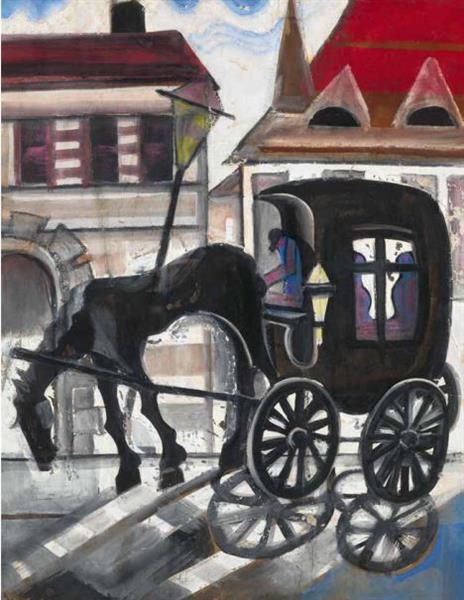Description
The painting "Város Gázlampaval Konflissal" by Hugó Scheiber is a work that, through its rich chromatic palette and its evocative composition, offers a penetrating look on urban life and its daily interactions. Scheiber, an outstanding exponent of the Hungarian impressionist movement, is characterized by its ability to capture the light and atmosphere of the scene, and this work is no exception. The representation of a city illuminated by lanteroles, which seem to bear in the bruma of dawn or at sunset, creates a nostalgic and almost dreamlike environment, which invites the viewer to immerse himself in his context.
The composition of the work is of a refined elegance. The arrangement of the elements, from buildings to lanterns, is perceived carefully balanced. This balance is strengthened by the use of diagonal lines that guide the viewer's gaze through painting, establishing an intrinsic relationship between the various architectural elements and the context in which they are. The lanterns, in particular, are not only light sources, but also symbolize life and movement in the city, acting as meeting points between shadows and clarity. The light they emit seems to vibrate in a harmonious dance with the environment, contributing to create an atmosphere of intimacy and warmth.
The use of color in "gázlampaval konflissal" is remarkable. Scheiber uses a varied palette that includes warm and cold tones, generating contrasts that enrich the perception of space. The yellow and orange of the lanterns contrast with the darkest tones of the environment, thus achieving that the light becomes the main protagonist of the work. This contrast game not only gives depth to the scene, but also establishes a dialogue between the artificiality of lanterns light and the ephemeral nature of time, reflecting a specific moment that could be both everyday and transcendental.
The composition of the work is completed with the presence of human figures, which, although on a small scale, are fundamental for visual narration. These figures, with their almost ghostly silhouettes, suggest the life that beats in the city. His postures and movements seem to tell individual stories, connected to the urban experience that captures Scheiber. Although they are not defined characters, their inclusion provides a sense of scale and humanity to the whole, reminding us that behind architecture and light there are intertwined lives in a vibrant urban fabric.
Throughout his career, Hugó Scheiber struggled to explore the dynamics between light and form, becoming a master in the representation of real life scenes. His approach, which often focused on everyday life and his nuances, as well as the changing nature of light, makes "gázlampaval konflissal" gázlampaval "a faithful representation of his personal style. His work reflects a subtle combination of realism and lyric, where each brushstroke is an echo of its appreciation for the beauty of everyday life.
In summary, "Város Gázlampaval Konflissal" is erected as a significant piece within the repertoire of Hugó Scheiber, inviting the viewer to contemplate not only the representation of an enlightened city, but also the human interactions that this light illuminates. The work is a vivid testimony of its technical mastery and its ability to capture the soul of urban life, deeply resonating the collective memory of an era and a place.
KUADROS ©, a famous paint on your wall.
Hand-made oil painting reproductions, with the quality of professional artists and the distinctive seal of KUADROS ©.
Art reproduction service with satisfaction guarantee. If you are not completely satisfied with the replica of your painting, we refund your money 100%.

